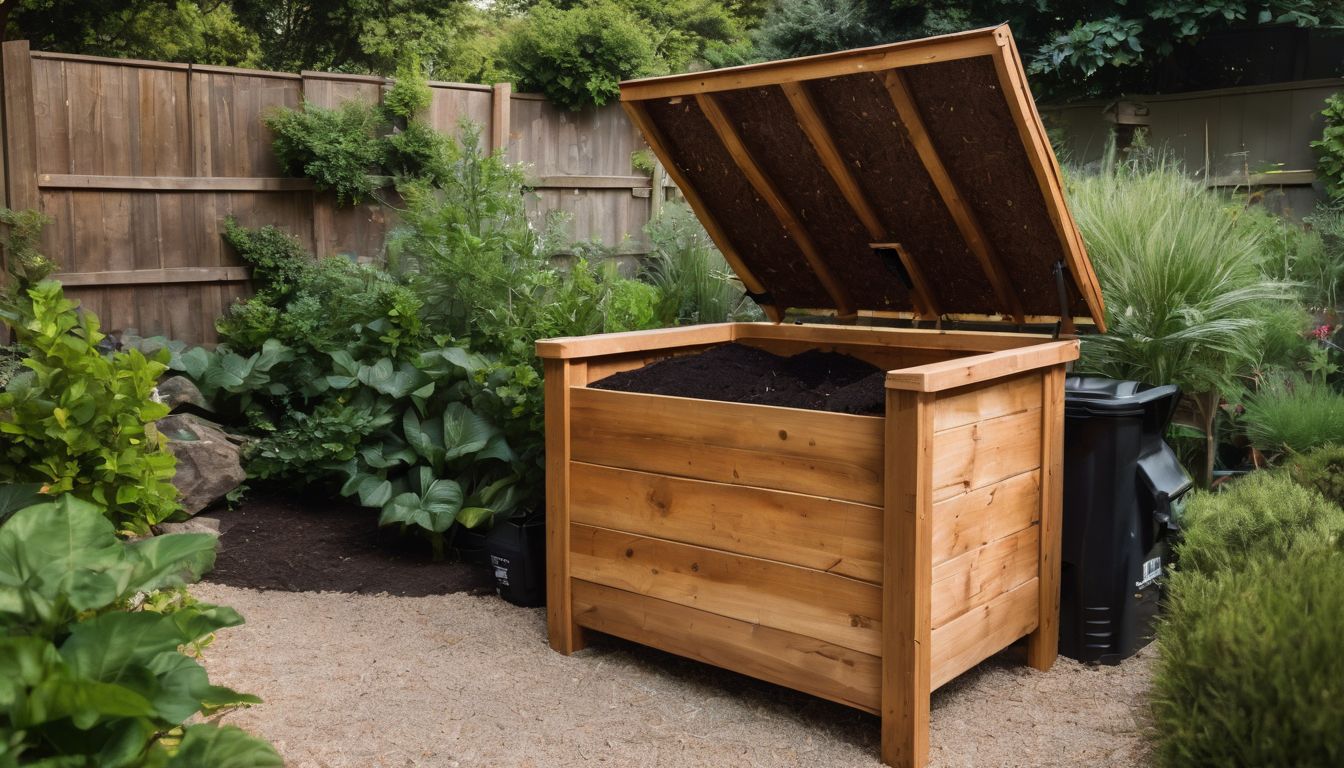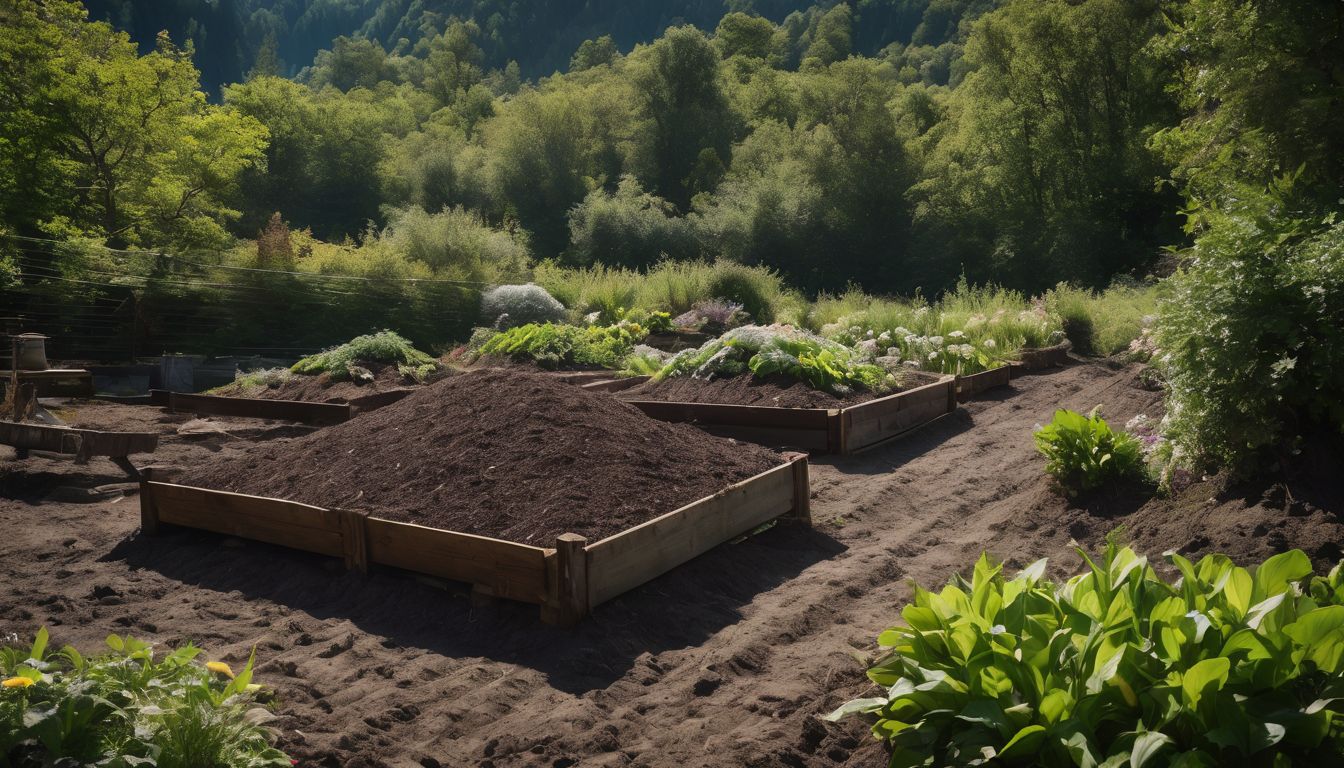Many people worry about their impact on the planet, particularly when it comes to waste. In fact, organic waste like food scraps can produce harmful methane gas if left in landfills.
This blog will unveil how turning your kitchen leftovers into compost not only reduces this issue but also benefits our earth in multiple ways. “Let’s dig into composting!”.
Key Takeaways
- Composting naturalises organic waste, which cuts down on methane emissions from landfills. It is a key step towards lowering the overall greenhouse gas effect.
- The practice of composting at home versus commercial methods offers flexibility for individuals and communities to manage waste sustainably and reduce their carbon footprint.
- By enriching soil with compost, we increase its ability to absorb CO2, helping in the fight against climate change through enhanced plant growth and reduced atmospheric carbon levels.
- Diverting waste from incineration by composting prevents harmful air pollution, keeping both our lungs and the environment cleaner.
- Reducing food loss through effective composting practices minimises wastefulness and contributes positively to environmental conservation efforts.
Understanding Composting
Composting is the natural process of recycling organic materials into a nutrient-rich soil amendment. There are different types of composting, including at-home and commercial methods, that contribute to reducing waste and greenhouse gas emissions.
Definition and process of composting
Composting is the natural process of recycling organic matter, like leaves and food scraps, into a valuable fertiliser that can enrich soil and plants. This method involves layering green waste which includes vegetable peelings, fruit scraps, and grass cuttings with brown waste such as twigs, paper, and dead leaves in a bin or pile.
Microorganisms break down these materials into humus after several months. The result is nutrient-rich compost that helps improve soil structure, maintain moisture levels, and keep your garden healthy.
To start composting at home, simply set aside a spot for your compost heap or bin. Alternate layers of green and brown materials while keeping the stack moist like a wrung-out sponge to aid decomposition.
Regular turning provides oxygen to the pile speeding up the process by allowing heat to build up inside. Your efforts will eventually turn daily leftovers into black gold for your garden without ever contributing to landfill methane emissions or chemical runoffs from traditional gardening practices.
Types of composting (at-home vs commercial)
Understanding the different methods of composting is key for those keen on reducing their environmental impact. At-home composting allows individuals to manage their organic waste personally, while commercial composting handles larger volumes at an industrial level. Below is a table summarising the key differences and features of each type:
| Composting Type | At-Home Composting | Commercial Composting |
|---|---|---|
| Scale | Small, personal use | Large, community or city-wide |
| Materials | Kitchen scraps, yard waste, paper | All of the above plus larger quantities of food waste, bioplastics |
| Process | Managed by individuals | Managed by businesses or municipalities |
| Timeframe | Variable, depending on method and maintenance | Faster due to controlled conditions |
| Cost | Minimal, investment in a bin or pile set-up | Higher, requires infrastructure and maintenance |
| Output | Compost for personal garden use | Bulk compost for landscaping, agriculture |
| Environmental Impact | Reduces household waste and methane emissions | Significantly cuts greenhouse gases on a larger scale |
Each approach plays a pivotal role in waste reduction and provides a valuable resource for growing plants. Choosing between at-home and commercial composting depends on individual needs and the capacity to manage waste sustainably.
Impact on Reducing Greenhouse Gases
Composting plays a crucial role in reducing greenhouse gases by diverting organic waste from landfills, where it would otherwise decompose and emit methane. It also helps to lower carbon emissions and minimise the overall carbon footprint associated with waste management.
Reduction of methane from landfills
Composting organic waste reduces methane emissions from landfills. When organic matter decomposes in a landfill without oxygen, it produces methane, a potent greenhouse gas. Composting diverting this waste from landfills helps to prevent the release of methane into the atmosphere.
Furthermore, using compost for soil enrichment also contributes to reducing carbon emissions by sequestering carbon in the soil and promoting sustainable agricultural practices. This approach can be an effective way for environmentally conscious individuals to support climate change mitigation efforts while contributing to sustainable waste management and soil health.
Lower carbon footprint
Composting reduces the carbon footprint by diverting organic waste from landfills, where it would otherwise release harmful methane gases. When food and yard waste decompose in landfills, they emit significant amounts of methane, a potent greenhouse gas that contributes to climate change.
By composting at home or supporting commercial composting facilities, individuals can play an active role in reducing their carbon footprint and mitigating the effects of greenhouse gas emissions on the environment.
Additionally, choosing to compost lowers the carbon footprint associated with waste management processes like incineration or transportation to landfills. Instead of contributing to air pollution through incineration or adding pressure on already overflowing landfills, composting presents a sustainable solution for managing organic waste while actively working towards reducing carbon emissions and promoting environmental conservation.
Co-benefits of Composting
Composting not only reduces greenhouse gases but also diverts waste from landfills, reducing air pollution from incineration. It’s an eco-friendly practice that promotes sustainable waste disposal and supports sustainable agriculture.
Reduction of waste sent to landfills
Composting reduces waste sent to landfill, lessening the environmental burden of organic waste. By diverting food scraps and garden trimmings from landfill disposal, composting helps decrease methane emissions.
It also prevents the build-up of greenhouse gases that contribute to climate change and air pollution. Instead of adding to landfills, where organic matter decomposes without oxygen and releases methane, composting transforms waste into a valuable resource for enriching soil.
The diversion of organic waste through composting contributes significantly to sustainable waste management and supports environmentally friendly practices. It reduces reliance on landfill disposal, minimises carbon footprint, and promotes renewable energy through the transformation of food scraps into nutrient-rich compost for sustainable agriculture.
Reduced air pollution from incineration
Composting reduces air pollution by diverting organic waste from incineration. When organic waste is burned, it releases harmful gases and particulate matter into the air, contributing to poor air quality and respiratory issues for humans.
By composting organic waste instead, we can significantly decrease the amount of waste sent to incinerators, thus reducing air pollution and its detrimental effects on both our health and the environment.
The reduction of air pollution from incineration through composting aligns with eco-friendly practices and organic waste management. By adopting composting as a part of daily living, individuals can actively contribute to lowering carbon footprints and supporting environmental benefits such as reduced methane emissions while promoting sustainable practices in their communities.
How Composting Can Help Fight Climate Change
Composting can help fight climate change by promoting the uptake of carbon dioxide in the soil and reducing food loss and waste. These eco-friendly practices contribute to a healthier environment and a more sustainable future.
Promoting uptake of carbon dioxide
Composting enriches soil, which in turn encourages plant growth and enhances the capability of plants to absorb carbon dioxide from the atmosphere. This process contributes directly to reducing greenhouse gases.
As organic matter decomposes during composting, it releases nutrients that improve soil health and enhance its ability to sequester carbon. Additionally, as the cycle continues with more composting, the uptick in plant growth further aids in capturing carbon from the air.
By promoting a healthy ecosystem for flora through composting practices, individuals can actively participate in enhancing nature’s capacity to mitigate climate change effects by effectively sequestering carbon dioxide.
Reducing food loss and waste
Promoting uptake of carbon dioxide through composting can also help in reducing food loss and waste. By diverting organic waste from landfills, composting not only reduces methane emissions but also lessens the amount of food wasted.
This practice aids in lowering the carbon footprint while contributing to eco-friendly practices. Additionally, composting at home or using community compost programs can be valuable steps in supporting conservation and environmental sustainability efforts.
Reducing food loss and waste is an essential aspect related to decreasing greenhouse gases. Composting provides a practical solution that environmentally conscious individuals can implement to combat climate change by actively participating in reducing food waste and landfill diversion.
Conclusion
In conclusion, composting offers an effective way to reduce greenhouse gas emissions. By diverting organic waste from landfills, it lowers methane production and fosters carbon sequestration.
Embracing composting as an eco-friendly practice can contribute significantly to mitigating climate change.
FAQs
1. How does composting help reduce greenhouse gases?
Composting cuts down on methane emissions by breaking down food waste properly, which helps in reducing our overall carbon footprint.
2. Can composting also lower the amount of waste we produce?
Yes, composting is great for food waste reduction, meaning less rubbish ends up in landfills where it can turn into harmful gases.
3. What are some other benefits of composting besides lowering greenhouse gases?
Besides cutting greenhouse gas emissions, composting has cobenefits like enriching soil and promoting ecofriendly practices that benefit our planet.
4. Is carbon sequestration a part of the composting process?
Absolutely! Composting naturally captures carbon from decaying organic matter and stores it in the soil, helping to sequester carbon from the atmosphere.





